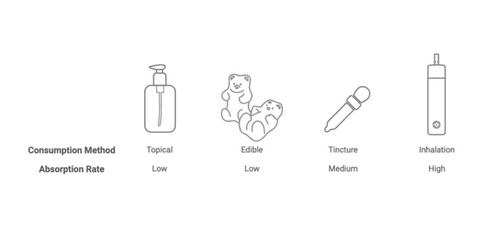Thinking about beginning a CBD regimen? Cannabidiol, abbreviated CBD, has quickly become one of the hottest trends in both the beauty and wellness industries. According to preliminary research, this cannabis byproduct may do wonders for your overall well-being. CBD is generally considered a safe supplement; however, there are some things you know before adding CBD to your routine to get the most out of the compound.
What Is CBD And What Does It Do?

There are certain molecular compounds unique to the cannabis plant called cannabinoids. These include THC, CBD, CBG, and literally hundreds of other minor cannabinoids. When we consume cannabinoids, they interact with a complex cell signaling called the endocannabinoid system (ECS), which is partly responsible for maintaining homeostasis in the human body. The ECS plays a critical role in regulating essential life functions such as memory retention, mood, sleep patterns, reproduction, and others.
Every cannabinoid interacts with the endocannabinoid system differently, resulting in different potential therapeutic effects. THC binds directly to the endocannabinoid receptors in the ECS, mimicking the neurotransmitters naturally produced by the body. Scientists speculate that this direct binding is what causes THC to produce the infamous high associated with marijuana use.
CBD, on the other hand, doesn’t quite fit as snugly in the endocannabinoid receptors. Instead, it loosely connects on the peripheral, acting as a minor antagonist and influencing how the receptors will interact with other chemical messengers in the body. As a result, taking CBD won’t get you high or make you feel intoxicated, but it could impact the functions governed by the ECS.
Currently, the FDA hasn’t been able to approve CBD for medicinal use, aside from the treatment of certain seizure disorders, due to a lack of clinical trials using human models. Historically, researchers have been hamstrung by the red tape and regulations imposed around cannabis research. However, the studies that we do have are incredibly promising and seem to indicate that CBD may have myriad therapeutic benefits.
For example, one recent 2018 study found that CBD could be an effective treatment for several chronic pain conditions without any of the adverse side effects of traditional pharmacological pain killers. Other studies suggest that CBD could be a potent anti-inflammatory that may help patients suffering from arthritis. Some other potential benefits include anxiety management, insomnia relief, acne treatment, seizure prevention, and appetite stimulation in patients suffering from terminal illnesses.
Full-Spectrum VS Broad-Spectrum VS CBD Isolate
Not all CBD is created equal. If you’ve already been looking into CBD, then you may have come across the terms full-spectrum, broad-spectrum, and CBD isolate.
Full-spectrum CBD incorporates the terpenes and cannabinoids naturally found in hemp. Cannabis researchers theorize that all of these therapeutic compounds work synergistically, increasing the individual benefit of each compound and making for a more effective CBD experience. This is known as the entourage effect. Full-spectrum CBD includes trace amounts of THC, though not enough to create feelings of intoxication.
CBD isolate is the purest form of CBD. You won’t find any terpenes or other minor cannabinoids in CBD isolate, just the CBD itself. If you are naturally sensitive to THC or are worried about frequent drug screenings for THC, CBD isolate may be a good choice.
Broad-spectrum contains all of the compounds found in full-spectrum CBD, only without the THC, making it a solid option for consumers who want some entourage effects without any THC.
How To Determine How Much CBD You Need

Every person will be affected by cannabinoids differently, making dosing guidelines a bit complicated. The average dose of CBD is somewhere around 20-50 mg, though some people can take up to 600 mg when treating severe conditions.
It’s generally recommended that new users start with a small dose, around 10 mg. If you don’t notice any uncomfortable side effects like drowsiness or dry mouth after a few days, titrate up the dose as needed until you find the dose that’s right for you.
Creative Ways To Incorporate CBD Into Your Daily Regimen

Unlike most other supplements, there are tons of different ways to consume CBD. It’s all about finding what will best fit your unique lifestyle.
Topical creams and skin serums apply CBD skin-deep, meaning the cannabinoid won’t actually enter the bloodstream. However, these can be useful in treating spot-specific surface-level pains like bruising, as well as helping to fight off blemishes on the face.
CBD capsules are perhaps the easiest way to incorporate CBD into your daily regimen—just swallow the capsule alongside your other vitamins and supplements. CBD oils can be used sublingually or even dropped into your morning cup of coffee.
For CBD users who want to get the most bang for their buck, inhalation methods like vaporizers or the elon® cannabinoid delivery system offer the highest bioavailability. This means that significantly more CBD will enter the bloodstream compared to oral administration methods, making your CBD more effective at lower doses.
Before starting a CBD regimen, always make sure to consult your physician. While CBD itself is relatively safe, it’s important to ensure the cannabinoid won’t have any adverse reaction with current medications.



